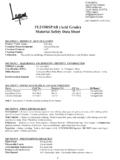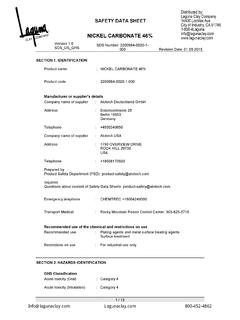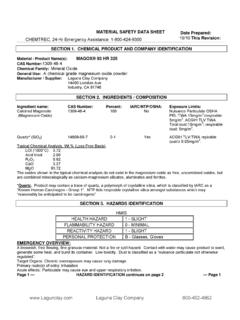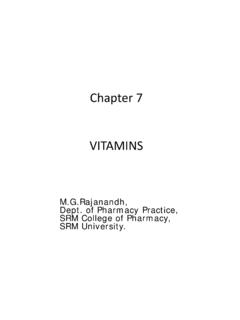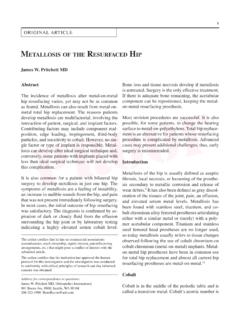Transcription of Safety Data Sheet Strontium Carbonate - Laguna …
1 Safety data SheetStrontium Carbonate 1 1. IDENTIFICATION OF THE MATERIAL AND SUPPLIERP roduct Name: Chemical Name: Recommended Use: Manufactured For: Phone: Emergency Phone: Strontium Carbonate Strontium Carbonate Pyrotechniques, Magnets, Ceramics, Glass, Electronics Laguna Clay Company14400 Lomitas AveCity of Industry, CA 91746(626) 330-0631 fax (626) 9112. HAZARDS IDENTIFICATIONC lassification: Not classified as hazardous according to criteria of NOHSC (Nat & Health Safety Commission). Signal Word: Warning Pictogram: Safety Phrases: Product dust may be irritating to eyes, skin and respiratory system. Risk Phrases: Possible risk of irreversible effects through inhalation. Risks of pulmonary overload (respiratory particulates). Environmental Hazards: None reported. 3. COMPOSITION/INFORMATION ON MATERIALC omponent CAS Number Proportion Strontium Carbonate 1633 05 2 > Barium Carbonate 513 77 9 < 4.
2 FIRST AID MEASURESI nalation: Remove the subject from dusty environment and let him blow his nose. If symptoms persist, call a physician. Eye contact: Rinse thoroughly with plenty of water, also under the eyelids. If eye irritation persists, consult a specialist. Skin contact: Wash off with soap and water. Remove and wash contaminated clothing before re use. If symptoms persist, call a physician. data SheetStrontium Carbonate 2 Ingestion: Call a physician immediately. If victim is conscious: If swallowed, rinse mouth with water (only if the person is conscious). Do NOT induce vomiting. If victim is unconscious but breathing: Artificial respiration and/or oxygen may be necessary. 5. FIRE FIGHTING MEASURESS uitable extinguishing media: Use extinguishing measures that are appropriate to local circumstances and the surrounding environment. Extinguishing media which shall not be used for Safety reasons None. Special exposure hazards in a fire: Not combustible.
3 Hazardous decomposition products formed under fire conditions. Special protective equipment for firefighters: No special precautions required. 6. ACCIDENTAL RELEASE MEASURESP recautions: Refer to protective measures listed in sections 7 and 8. Environmental precautions: Should not be released into the environment. Methods for cleaning up: Sweep up and shovel into suitable containers for disposal. Avoid dust formation. Keep in properly labelled containers. Keep in suitable, closed containers for disposal. Treat recovered material as described in the section "Disposal considerations". AND STORAGEH andling: Use only in well ventilated areas. Keep away from incompatible products Storage:Keep in a dry place. Store in original container. Keep container closed. Keep away from Incompatible products. Packaging material: Paper and PE Other information: Avoid dust formation. Refer to protective measures listed in Sections 7 & 8.
4 data SheetStrontium Carbonate 3 CONTROLS/PERSONAL PROTECTIONL imit Values Barium Carbonate US. ACGIH Threshold Limit Values 01 2006 Time weighted average = mg/m3 Remarks: as Ba Nanoparticles: Remarks: none established, Avoid exposure obtain special instructions before use. Exposure controls: Ensure adequate ventilation. Provide appropriate exhaust ventilation at places where dust is formed. Refer to protective measures listed in sections 7 and 8. Apply technical measures to comply with the occupational exposure limits. Occupational exposure controls Respiratory protection Use only respiratory protection that conforms to international/ national standards. Recommended Filter type: P3 Hand protection: Protective gloves Suitable material: PVC, Natural Rubber Unsuitable material : Do not wear neoprene gloves, as neoprene absorbs nanoparticles. Eye protection: Dust proof goggles, if dusty. Skin and Body Protection : long sleeved clothing, apron, boots, PVC Hygiene measures: When using do not eat, drink or smoke.
5 Wash hands before breaks and at the end of workday. Handle in accordance with good industrial hygiene and Safety practice. Environmental exposure controls : Dispose of rinse water in accordance with local and national regulations. 9. PHYSICAL AND CHEMICAL PROPERTIESG eneral Information (appearance, odor) Appearance: powder, pellets Color: white Odor: odorless Important health Safety and environmental information pH: 7 8 Remarks: saturated aqueous solution Temperature: 20 C Boiling point/boiling range: not applicable, Decomposition Flash point: not applicable Flammability: product is not flammable. Explosive properties: Explosion danger: Remarks: Not explosive Oxidizing properties: Non oxidizer data SheetStrontium Carbonate 4 Vapor pressurenot applicable Relative density / Density: Bulk density from 300 700 kg/m3 (powder) from 1,200 2,000 kg/m3 (pellets) Solubility:Water, g/l, Temperature: 18 C Partition coefficient: not applicable n octanol/water Vapor density: not applicable Melting point/range: not applicable, Decomposition Auto flammability: no data available Granulometry: 10 m (powder), Remarks: d 50, nanoparticles 80 % > mm (pellets) Decomposition temperature: > 1,340 C AND REACTIVITYS tability Stable under recommended storage conditions.
6 Contact with acids liberates CO2, sometimes violently. Conditions to avoid: none Materials to avoid: Incompatible with acids. Hazardous decomposition products: Strontium oxide. The release of other hazardous decomposition products is possible. INFORMATIONT oxicological data Acute oral toxicity LD50, rat, > 2,000 mg/kg Chronic toxicity Oral, Repeated exposure, rat, Target Organs: skeleton, observed effect Inhalation, after a single exposure, rat, Target Organs: Respiratory system, observed effect Possible hazards (summary) Product dust may be irritating to eyes, skin and respiratory system. No data exists on the effects of nanometer sized particles on the body. Other dangerous properties cannot be excluded. data SheetStrontium Carbonate 5 Health effects Main effects Chronic exposure to the product can cause bone calcification disorders. Product dust may be irritating to eyes, skin and respiratory system. Possible risk of irreversible effects through inhalation.
7 Inhalation Repeated or prolonged exposure: chronic bronchitis, Risk of pulmonary overload (respirable particulates). (in case of higher concentration): chemical pneumonitis. Eye contact Contact with eyes may cause irritation. Skin contact The product may be absorbed through the skin. May cause skin irritation and/or dermatitis. Ingestion No reported cases of intoxication in man. INFORMATIONE cotoxicity effects Acute toxicity Remarks: no data available Chronic toxicity Remarks: no data available Mobility Air: Remarks: mobility as solid aerosols Water/soil Remarks: low solubility and mobility Persistence and degradability Abiotic degradation water/soil Result: slow ionization and cation precipitation in presence of sulfates or carbonates Biodegradation Remarks: The methods for determining biodegradability are not applicable to inorganic substances. Bioaccumulative potential Bioconcentration: Terrestrial plants, various species Result: potential accumulation of the cation Other adverse effects no data available Possible hazards (summary) no data available Ecological injuries are not known or expected under normal use.
8 Persistent product mainly in its inert form. data SheetStrontium Carbonate 6 CONSIDERATIONSW aste from residues / unused products In accordance with local and national regulations. Dispose of wastes in an approved waste disposal facility. Packaging treatment Containers that cannot be cleaned must be treated as waste. Or Must be incinerated in a suitable incineration plant holding a permit delivered by the competent authorities. INFORMATIONR emarks: DOT not regulated INFORMATIONL abels: Not classified as hazardous according to criteria of NOHSC. Inventory Information Toxic Substance Control Act list (TSCA) : In compliance with Inventory of Chemical Substances (AICS) : In compliance with inventory. Canadian Domestic Substances List (DSL) : In compliance with inventory. Korea Existing Chemicals Inv. (KECI) (KECI (KR)) : In compliance with inventory. EU list of existing chemical substances (EINECS) : In compliance with (ENCS) List (ENCS (JP)) : In compliance with inventory.
9 Inventory of Existing Chemical Substances (China) (IECS) : In compliance with Inventory of Chemicals and Chemical Substances (PICCS) : In compliance with inventory. New Zealand Inventory (in preparation) (NZ) : In compliance with data SheetStrontium Carbonate 7 INFORMATIONA dministrative information General revision Distribute new edition to clients The information given corresponds to the current state of our knowledge and experience of the product, and is not exhaustive. This applies to product which conforms to the specification, unless otherwise stated. In this case of combinations and mixtures one must make sure that no new dangers can arise. In any case, the user is not exempt from observing all legal, administrative and regulatory procedures relating to the product, personal hygiene, and protection of human welfare and the environment. Issue Date: 04/29/2015


